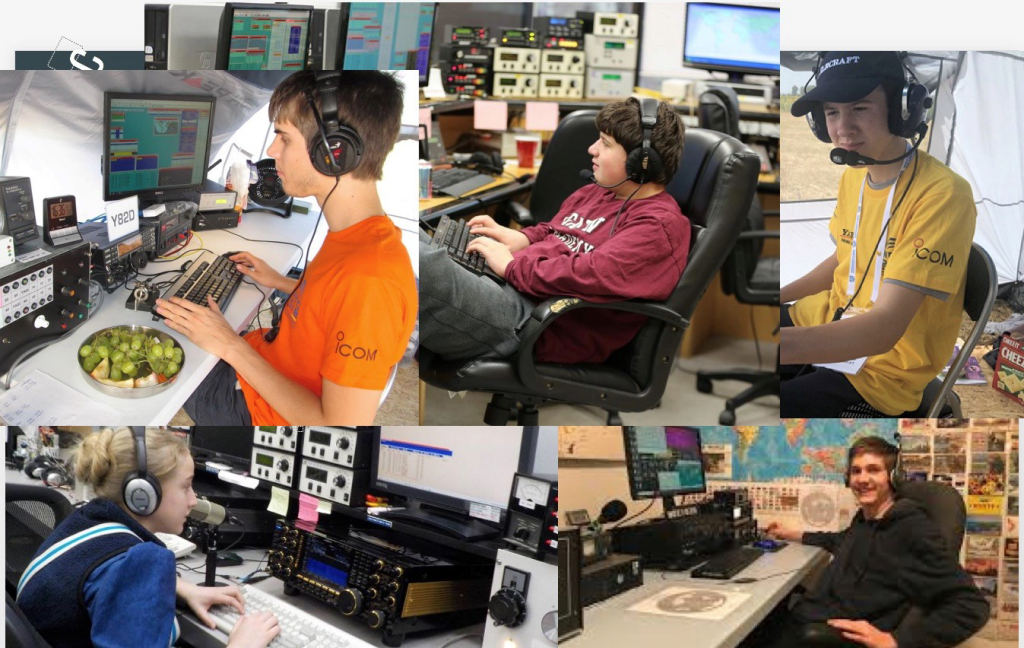The most wonderful time of the year for many hams is right around the corner—Contesting Season! It’s a great time for young operators who may be interested in trying out contesting for the first time.
For those unfamiliar with the term “Contesting Season,” it refers to the few months most densely packed with major contests. For 2025, it starts with the CQ WW SSB, which takes place Oct. 25-26. The CW portion of the contest runs Nov. 29-30.
Nearly all of the major contests have youth categories, including the CQ WW, which makes them more accessible to young people who are looking to get started.

Editor’s Note: Also in November 2025 you’ll find the ARRL Sweepstakes (Nov. 1-3, CW; Nov. 15-17, Phone). It’s open to all ages and includes a School Club category.
From a more logistical standpoint, though, there are a number of ways young people can dip their feet (or jump) into the contesting world that exist within the bubble of amateur radio.
First, young people could look for a contest team that would be willing to add another operator. This is a strong option because of the support that comes from being part of a multi-operator contest effort.
Even if the team only has one or two people operating at once, there will be others there who can help mentor you through the contest. At first, it may feel like you’re drinking from a fire hose of information coming at you, considering how many tiny things there are to remember. This includes how the specific features of the station work, where to point your antennas depending on what time of day it is, and the propagation from your location. After some practice, the feeling of being overwhelmed slowly starts to disappear, but it initially can be quite a bit to manage.
Another option for operating in your first contest is to enter as a single operator. This may be more challenging if you’re a true beginner and haven’t ever done a contest before, but it is also an amazing way to learn a lot (especially through trial and error!). If you opt to go this route, it may be beneficial to talk to more experienced contesters before the big weekend and get a basic grasp of the most important aspects of contesting so you’re not just jumping into the deep end.
Some things to keep in mind, especially if you’ve decided to do your first contest on your own as a single operator:
- Make a plan before you start the contest.
- Do your research to help decide what logging software to use, what category to enter, what category might give you the best chance of being competitive, and other logistical concerns.
It’s a good idea to learn some of the basic contesting jargon that may be used between members of a team and among operators making actual contacts on the air. Familiarize yourself with the logging software you choose before the contest—this can help eliminate (or at least reduce) bumps in the road as you’re operating.


Also remember that for some contests, logs from past participants are publicly available. Studying these can be extremely beneficial to new contesters. They’re essentially an overview of how the contest functions during its operating period. From these past logs, you’ll be able to glean information like patterns of where (both in terms of what bands and geographically) and when (what times of day, what part of the contest period) past operators and teams had the most success.
These “overviews” can help you develop a plan for what bands to utilize and a strategy for getting the most points possible. As a beginning operator, the logs can give you an idea of what is achievable and where you can, or should, set your goals. That being said, it’s helpful to set goals before your contest operation. They could be as simple as making a certain number of contacts, working a certain number of DXCC entities, operating for a certain number of hours, or achieving/sustaining a specific rate during your contesting. Your goals will help to keep you motivated and give you something to work toward if those late-night and early-morning hours seem to be dragging here and there.
No matter how you choose to get started in amateur radio contesting, there is certainly a learning curve. Just like any aspect of the hobby, though, the work you put into contesting is well worth it. You’ll have innumerable opportunities to learn new things, make new friends around the world, and extend your comfort zone. Contesting is now one of my favorite parts of amateur radio, and I couldn’t be more grateful for the places it has taken me and the people that it has let me meet.

